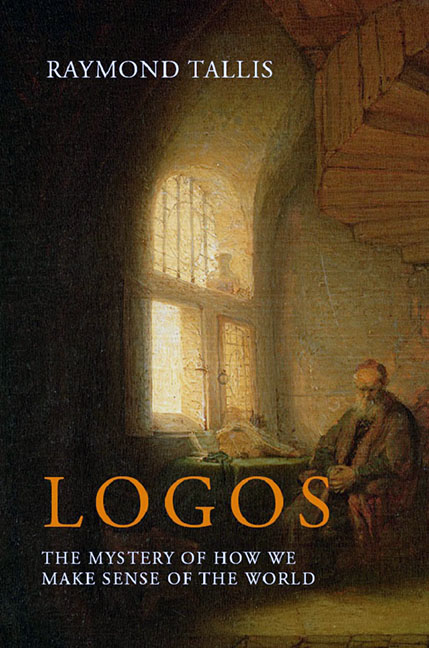Book contents
- Frontmatter
- Dedication
- Contents
- Acknowledgements
- Preface
- Overture
- 1 Seeing the sense-making animal
- 2 Logos: a brief backward glance
- 3 Deflating the mystery 1: putting the world inside the mind
- 4 Deflating the mystery 2: logos as bio-logos
- 5 The escape from subjectivity
- 6 Thatter: knowledge
- 7 Senselessness at the heart of sense
- 8 Towards a complete comprehension of the world?
- Coda
- Notes
- References
- Index
Coda
Published online by Cambridge University Press: 09 August 2023
- Frontmatter
- Dedication
- Contents
- Acknowledgements
- Preface
- Overture
- 1 Seeing the sense-making animal
- 2 Logos: a brief backward glance
- 3 Deflating the mystery 1: putting the world inside the mind
- 4 Deflating the mystery 2: logos as bio-logos
- 5 The escape from subjectivity
- 6 Thatter: knowledge
- 7 Senselessness at the heart of sense
- 8 Towards a complete comprehension of the world?
- Coda
- Notes
- References
- Index
Summary
It is necessary to combine recognition of our contingency, our finitude, and our containment in the world with an ambition of transcendence, however limited may be our success in achieving it.
Thomas NagelOne might say that the history of thought could be summarized in these words: It is absurd by what it seeks, great by what it finds.
Paul ValéryIt is time to conclude our inquiry into the sense-making animal, our endeavour to understand or (if that is too ambitious) to see a little more clearly the fact that we are able at least in part to comprehend the universe and that we seem to progress to ever higher or more complete levels of comprehension. This becomes all the more extraordinary as cognitive advance enlarges the scale of its own object. We have always been pin-pricks in a world that out-sizes us many-fold but the billions of light years that now routinely populate our conversations have reduced us proportionately. It is even more remarkable, given that we cannot get ourselves out of the way as the necessary subjects of knowledge and, as Nagel puts it, “our ambitions of transcendence” have to be combined “with recognition of our contingency, our finitude, and our containment in the world”. The very idea of total understanding is inescapably absurd but the history of thought it has prompted is “great by what it finds”.
We have always been smaller than what we know: if we are great in virtue of our knowledge, we are minute in the light of that knowledge. This is evident, at the level of perception, in our visual field, where we are located at the centre of a space given all at once that may exceed many-thousand-fold the volume occupied by our bodies. The widening, encircling horizon shrinks us to a mustard grain. Vision is the metaphor of knowledge – and for good reasons. Knowledge is mediated awareness: I can access that object over there without being in direct contact with it. This asymmetry liberates us from the equality of action and reaction that is evident in touch, where I am pressed by that which I palpate. The inequality of the seer and the seen empowers the seers even at the cost of their feeling dwarfed by the vastness of the visual field.
- Type
- Chapter
- Information
- LogosThe Mystery of How We Make Sense of the World, pp. 207 - 212Publisher: Agenda PublishingPrint publication year: 2018



